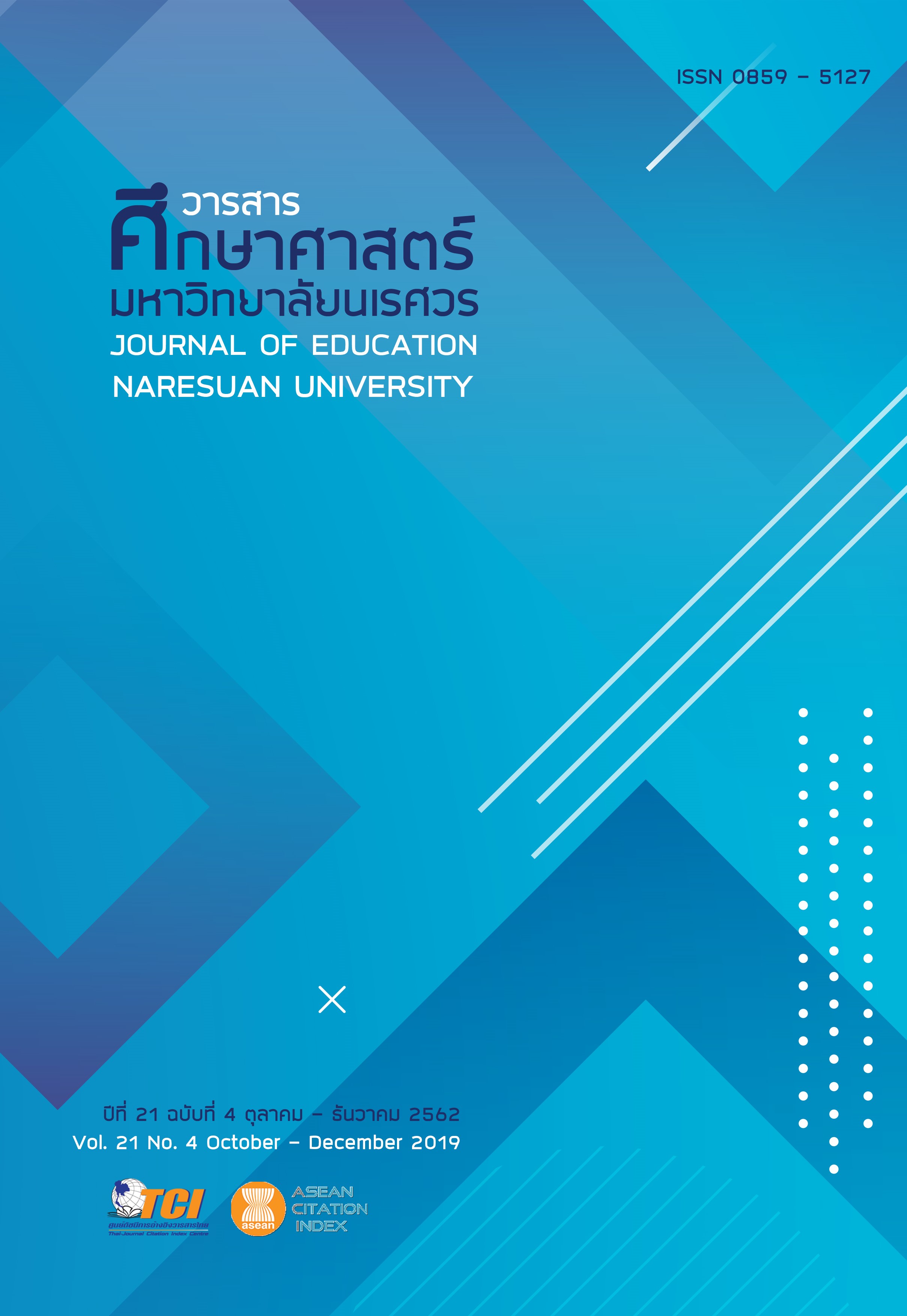ผลของการจัดการเรียนรู้โดยใช้ปัญหาเป็นฐานร่วมกับการใช้คำถามระดับสูงที่มีต่อผลสัมฤทธิ์ทางการเรียนวิชาวิทยาศาสตร์และความสามารถในการคิดแก้ปัญหา เรื่อง อาหารกับการดำรงชีวิต ของนักเรียนชั้นมัธยมศึกษาปีที่ 2 (THE EFFECTS OF LEARNING MANAGEMENT USING PROBLEM–BASED LEARNING WITH HIGHER–ORDER QUESTIONS ON LEARNING ACHIEVEMENT IN SCIENCE AND PROBLEM SOLVING ABILITY ON FOOD AND LIVELIHOOD OF 8th GRADE STUDENTS)
Main Article Content
Abstract
การวิจัยนี้มีวัตถุประสงค์เพื่อเปรียบเทียบผลสัมฤทธิ์ทางการเรียนและความสามารถในการคิดแก้ปัญหาของนักเรียนที่ได้รับการจัดการเรียนรู้โดยใช้ปัญหาเป็นฐานร่วมกับการใช้คำถามระดับสูง ก่อนเรียนและหลังเรียน และเปรียบเทียบผลสัมฤทธิ์ทางการเรียนและความสามารถในการคิดแก้ปัญหาของนักเรียนที่ได้รับการจัดการเรียนรู้โดยใช้ปัญหาเป็นฐานร่วมกับการใช้คำถามระดับสูง หลังเรียนกับเกณฑ์ร้อยละ 70 กลุ่มตัวอย่างที่ใช้ในการวิจัย ได้แก่ นักเรียนชั้นมัธยมศึกษาปีที่ 2 โรงเรียนดาราสมุทร ศรีราชา ภาคเรียนที่ 2 ปีการศึกษา 2559 จำนวน 1 ห้องเรียน ได้มาจากการสุ่มแบบกลุ่ม จำนวน 49 คน เครื่องมือที่ใช้ ได้แก่ แผนการจัดการเรียนรู้โดยใช้ปัญหาเป็นฐานร่วมกับการใช้คำถามระดับสูง แบบทดสอบวัดผลสัมฤทธิ์ทางการเรียนและแบบทดสอบวัดความสามารถในการคิดแก้ปัญหา ซึ่งวิเคราะห์ข้อมูลโดยเปรียบเทียบความแตกต่างของคะแนนผลสัมฤทธิ์ทางการเรียนและความสามารถในการคิดแก้ปัญหาโดยใช้การทดสอบที ผลการวิจัย พบว่า ผลสัมฤทธิ์ทางการเรียนของนักเรียนที่ได้รับการจัดการเรียนรู้โดยใช้ปัญหาเป็นฐานร่วมกับการใช้คำถามระดับสูง หลังเรียนสูงกว่าก่อนเรียนและสูงกว่าเกณฑ์ร้อยละ 70 อย่างมีนัยสำคัญทางสถิติที่ระดับ .05 ความสามารถในการคิดแก้ปัญหาของนักเรียนที่ได้รับการจัดการเรียนรู้โดยใช้ปัญหาเป็นฐานร่วมกับการใช้คำถามระดับสูง หลังเรียนสูงกว่าก่อนเรียน และสูงกว่าเกณฑ์ร้อยละ 70 อย่างมีนัยสำคัญทางสถิติที่ระดับ .05
THE EFFECTS OF LEARNING MANAGEMENT USING PROBLEM–BASED LEARNING WITH HIGHER–ORDER QUESTIONS ON LEARNING ACHIEVEMENT IN SCIENCE AND PROBLEM SOLVING ABILITY ON FOOD AND LIVELIHOOD OF 8th GRADE STUDENTS
The purposes of this research were to compare learning achievement and problem solving ability of students using problem-based learning with higher-order questions before and after learning, and to compare learning achievement and problem solving ability of students after using problem-based learning with higher-order questions with 70 percent criteria. The samples for this research consisted of 49 grade eight students who studied in the second semester of the academic year 2016 from Darasamutr Sriracha School using cluster random sampling. The research instruments were problem-based learning with higher-order questions lesson plans, learning achievement test and problem solving ability test. The data were analyzed by comparing the difference of an achievement scores and problem solving ability using t-test.
The research findings were showed that learning achievement of students after using problem-based learning with higher-order questions was higher than before learning and higher than 70 percent criteria with statistically significant at .05 level. Problem solving ability of students after using problem-based learning with higher-order questions was higher than before learning and higher than 70 percent criteria with statistically significant at .05 level.
Article Details
The owner of the article does not copy or violate any of its copyright. If any copyright infringement occurs or prosecution, in any case, the Editorial Board is not involved in all the rights to the owner of the article to be performed.
References
2. Darasamutr Siracha School. (2015). Report of Darasamutr Siracha School 2015. Chonburi: Darasamutr Siracha School. [in Thai]
3. Duangmanee, K., Promchatsunthon, C., & Hongngern, V. (2012). The study in 21st century: Education guidelines for creating new species of students. School in focus, 4(11), 4 – 7. [in Thai]
4. Heepkew, P. (2009). The development of Mathayomsuksa 3 students’ problem solving ability and learning achievement in the science unit on “Resources and Environment” using problem-based learning (PBL) (Master thesis). Khon Kaen: Khon Kaen University. [in Thai]
5. Inthanon, B. (2008). A study on science learning achievement and ability in solving science problems through problem-based learning and inquiry process of Matthayomsuksa 3 students at Yotinbumrung School (Master thesis). Bangkok: Srinakharinwirot University. [in Thai]
6. Khammani, T. (2012). Teaching strategy: Knowledge for effective learning process (16th ed.). Bangkok: Chulalongkorn University. [in Thai]
7. National Institute of Educational Testing Service (Public Organization). (2016). Average act science score. Retrieved March 2, 2016, from http://www.onetresult.niets.or.th [in Thai]
8. Onyon, N. (2008). Effects of inquiry-based science instruction using higher-order questions on analyzing and synthesizing thinking ability of lower secondary school students (Master thesis). Bangkok: Chulalongkorn University. [in Thai]
9. Phinla, W. (2016). Learning management process of social studies teachers in the development of critical thinking among students in the 21st century. Journal of Education Naresuan University, 18(4), 349-359. [in Thai]
10. Pimkheeree, N. (2012). A study of grade 10 students problem solving ability about on substances in radioactivity and nuclear energy by using problem based learning (Master thesis). Khon Kaen: Khon Kaen University. [in Thai]
11. Sattayasai, W. (2004). Problem-based learning: Student-centered learning. Bangkok: Booknet. [in Thai]
12. Srisawat, Y., & Siripan, S. (2011). Student-centered learning: Problem-Based Learning. Princess of Naradhiwas University Journal, 3(1), 109. [in Thai]
13. Susaorat, P. (2013). Thinking development (5th ed.). Bangkok: 9119 Technic Printing. [in Thai]
14. Suttirat, C. (2010). Questions method for develop of thinking. Bangkok: Sahamit printing and publishing. [in Thai]
15. William, W. W. (1987). Questions, questioning techniques, and effective teaching. Washington D.C.: National Education Association.
16. Worakam, P. (2012). Educational research (4th ed.). Mahasarakham: Rajabhat Mahasarakham University. [in Thai]

